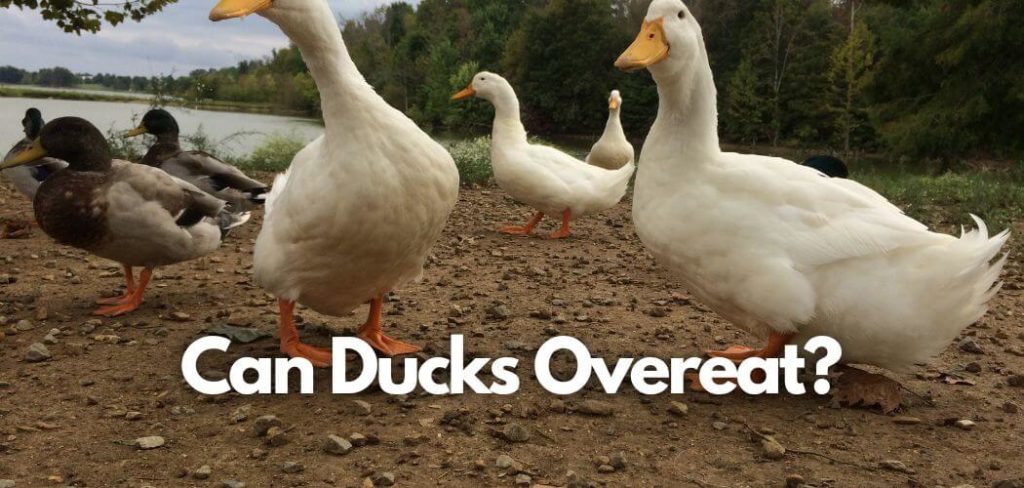Do ducks overeat? While ducks are known for their love of food and their ability to eat almost anything, it is important to understand if overeating can be harmful to their health.
In this article, we will explore the topic of whether ducks overeat and what the potential consequences may be.

Do ducks overeat?
Ducks are known for their love of food, and it’s not uncommon to see them gobbling up everything in sight. But do ducks overeat? The answer is yes, they can.
Like many animals, ducks will eat as much as they can when food is available, which can lead to overeating.
This can be a problem for domestic ducks, which may have access to unlimited amounts of food.
Overeating can lead to obesity, which can cause health problems such as joint pain, heart disease, and liver problems.
In the wild, ducks have to work harder to find food, and their diets are more varied. This means they are less likely to overeat.
However, even wild ducks can overeat if they come across a particularly abundant food source.
To prevent overeating in domestic ducks, it’s important to monitor their food intake and provide them with a balanced diet.
This can include a mix of commercial duck feed, fresh vegetables, and other treats in moderation.
It’s also important to provide ducks with plenty of opportunities for exercise. This can include swimming, foraging for food, and simply walking around.
Regular exercise can help prevent obesity and keep ducks healthy.
Risks of overeating in ducks:
Overeating in ducks can lead to several health issues, including obesity, heart disease, and liver problems.
Just like humans, ducks can suffer from high cholesterol levels, which can cause blockages in their arteries and increase the risk of heart attacks and strokes.
In addition, overeating can put a strain on a duck’s liver, which can lead to liver failure and other related diseases.
It is also essential to monitor your duck’s weight and ensure that they are not overfed.
Overfeeding can lead to rapid weight gain, which can be difficult to reverse. It is recommended to provide your ducks with a balanced and healthy diet, consisting of a mix of grains, vegetables, and proteins.
Avoid feeding them too many treats or high-fat foods, as this can contribute to weight gain.
Overfeeding ducks can lead to food dependency, where they become reliant on you for their food.
This can be problematic if you need to leave your ducks for an extended period, as they may not be able to fend for themselves.
It is important to ensure that your ducks have access to natural food sources, such as insects and plants, to encourage foraging behavior and reduce their reliance on you for food.
How often should you feed your ducks?
Feeding your ducks is an important part of their care, but overfeeding can lead to health problems. So, how often should you feed your ducks?
It’s recommended that ducks be fed twice a day, once in the morning and once in the evening. This ensures that they have access to food throughout the day and can maintain a healthy weight.
When feeding your ducks, it’s important to provide them with a balanced diet that includes both commercial feed and fresh foods.
Commercial feed should make up the bulk of their diet, but fresh foods such as fruits and vegetables can be offered as treats.
It’s also important to monitor your ducks’ food intake and adjust their portions accordingly. Overfeeding can lead to obesity, which can cause health problems such as heart disease and joint pain.
In addition to providing regular meals, it’s important to make sure your ducks have access to clean water at all times. Ducks need water to help them digest their food and stay hydrated.
Are there certain foods that ducks will overeat?
Ducks are opportunistic feeders and will consume a wide variety of foods. However, certain types of food can be more appealing to ducks, leading to overeating and potential health problems.
One food that ducks are notorious for overeating is bread. While bread may seem like a harmless treat to feed ducks, it is quite unhealthy for them.
Bread lacks the necessary nutrients that ducks need to maintain a healthy diet, and overconsumption of bread can lead to malnutrition and obesity.
Another food that ducks may overeat is corn. Corn is a popular food for ducks and is often used as bait for hunting.
However, too much corn can lead to digestive problems and cause ducks to become overweight.
It’s important to remember that while ducks may enjoy certain types of food, it’s crucial to provide them with a balanced diet.
Feeding ducks, a variety of foods such as leafy greens, grains, and insects can help ensure that they receive the necessary nutrients to maintain a healthy weight and avoid overeating.
What time of the year are ducks likely to eat more?
Ducks are known to have a voracious appetite, but their feeding habits can vary depending on the time of the year.
During the breeding season, which typically occurs in the spring and summer months, ducks tend to eat more to support their increased energy needs.
In the fall, ducks will start to prepare for migration, a process that requires a lot of energy. As a result, they will often eat more to build up their fat reserves for the long journey ahead.
During the winter months, ducks may have a harder time finding food, especially if bodies of water freeze over.
As a result, they may eat more when food is available to ensure they have enough energy to survive the colder months.
It’s important to note that while ducks may eat more during certain times of the year, overeating is not typically a concern for these birds.
Ducks have a natural ability to regulate their food intake based on their energy needs, and will typically stop eating once they are full.
However, feeding ducks large amounts of bread or other human foods can disrupt their natural feeding habits and lead to health problems.
How to know if you are overfeeding your ducks:
Feeding ducks can be a fun and rewarding experience, but it’s important to make sure you’re not overfeeding them.
Here are some ways to know if you’re overfeeding your ducks:
1. Pay attention to their behavior
If your ducks are constantly begging for food, even after you’ve given them their daily ration, it’s a sign that they may be overfed.
Additionally, if they are lethargic or not as active as usual, it could be a sign that they are consuming too many calories.
2. Monitor your ducks weight
Regularly monitoring your ducks’ weight can help you determine if they are being overfed. If they are gaining weight too quickly, it’s a sign that they may be consuming too much food.
3. Observe their droppings
Ducks’ droppings can provide valuable insight into their health. If their droppings are loose or runny, it could be a sign that they are being overfed.
Additionally, if their droppings are very large, it could be a sign that they are consuming too much food.
4. Use a feeding chart
Using a feeding chart can help ensure that you’re providing your ducks with the appropriate amount of food.
A feeding chart will take into account the size and age of your ducks, as well as their level of activity, and provide you with a recommended amount of food to give them each day.
By following these tips, you can ensure that you’re not overfeeding your ducks and keeping them healthy and happy.
How to prevent overeating in ducks:
One way to prevent overeating in ducks is to monitor their diet. You should ensure that the ducks are not consuming too much of a certain type of food, such as bread, which is high in carbohydrates and low in nutrients.
Instead, provide a balanced diet that includes a variety of foods, such as grains, vegetables, and protein-rich foods.
Another way to prevent overeating is to use controlled feeding strategies. This can include feeding the ducks at set times and in limited quantities.
You can also use feeders that limit the amount of food that is dispensed at one time. By using controlled feeding strategies, you can ensure that the ducks are not consuming too much food at once, which can lead to overeating.
Finally, managing the ducks’ habitat can also help prevent overeating. By providing a natural environment that includes a variety of plants and other food sources, you can encourage the ducks to forage for their food.
This can help prevent overeating by allowing the ducks to regulate their food intake.
Additionally, providing plenty of space for the ducks to move around can also help prevent overeating by encouraging them to be active.
Final Thoughts:
To ensure that your ducks are not overeating, provide them with the appropriate amount of food according to their size and activity level.
You can also consider using feeding methods that encourage natural foraging behaviors, such as scattering food throughout their environment or using feeding toys.
Sources:
alifeofheritage:What Do Ducks Eat? How-To and Tips for Domestic and Wild Ducks
